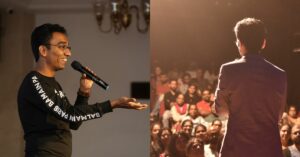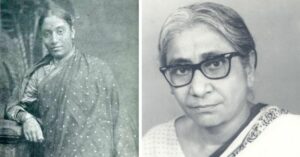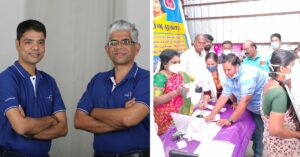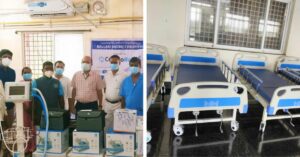With Neurology-on-Wheels, Doctor Takes Free Epilepsy & Stroke Treatment to Rural Andhra
Dr Bindu Menon’s foundation runs an initiative called Neurology-on-Wheels, offering free healthcare services to remote areas since 2013. She is also noted for her research in the field of epilepsy, strokes, and other neurological diseases.
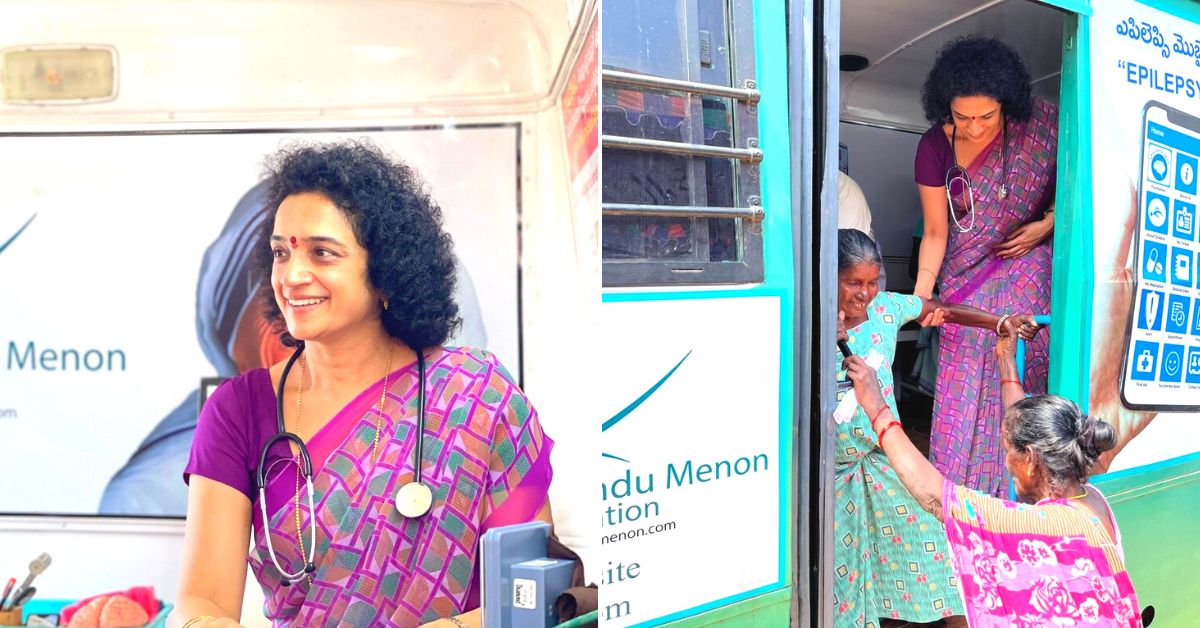
Sometime in early 2008, Dr Bindu Menon was dropping her daughter to school when other parents and teaching faculty began crowding around her in the corridor, seeking advice on different neurological conditions. This wasn’t the first time it had happened to the neurologist serving as an associate professor at a medical college in Tirupathi, Andhra Pradesh.
This was a common occurrence for the good doctor.
“While talking to these people, I found a lack of awareness about neurological conditions, as well as my inability to answer all their queries properly. So, I thought it would be advisable to create awareness among the public about neurological disorders because in general people feel that they are untreatable,” explains Dr Menon, who is currently serving as a professor and head of the neurology department at Apollo Specialty Hospitals in Nellore, in a conversation with The Better India.
“For example, once someone has a stroke, they believe that the patient is bedridden for life. Or that symptoms like back or neck pains are nothing to worry about. During my conversations with them, I also heard people treating epilepsy as a serious social stigma and saying individuals with that condition can’t get married or have a normal life, etc. These were some of the beliefs the general public had when I interacted with them on a non medical platform,” adds Dr Menon.
During her final year in Tirupathi, Dr Menon embarked on a journey towards raising awareness about neurological conditions among the public, starting with schools and colleges. Even after moving to Nellore later that year, she continued on this journey. So far, she has completed around 210 awareness campaigns, which includes schools, colleges and a myriad of different social organisations in the state.
But this isn’t all she has done.
Under the aegis of her non-profit Dr Bindu Menon Foundation, she has organised free treatment camps for hundreds of underprivileged patients with epilepsy, stroke and other conditions, while also pioneering a fascinating initiative called ‘Neurology on Wheels’.
Here, the celebrated neurologist from Kerala travels to deprived villages in the rural interiors of Nellore district with a team of volunteers to raise awareness about common neurological conditions, screen and treat them, and distribute free medication in certain cases.
“We have now organised more than 200 free medical camps across 44 villages through our Neurology on Wheels initiative. We have educated and screened around 12,000 people now. The number of patients we detected in these villages — who were not on treatment but received counselling, medication and referral to the nearest health centre from me — has been 140 for stroke, 105 for epilepsy, 361 for hypertension and 133 for diabetes,” claims Dr Menon.
Besides Neurology on Wheels, in 2016 she launched Epilepsy Help, an app which sends alerts to families of epileptic patients in emergencies like sudden seizures. During the peak of the pandemic, she also launched a Stroke Help app for patients unable to reach their doctors. These apps, however, need further work to align with the privacy norms of app stores.
Her foundation has also recently started the EDuWAND (Educating Women about Neurological Diseases) project with the goal to address both the burden of stroke for women and to leverage their role within the family. The EDuWAND project involves targeted education on stroke for women and focuses on increasing their participation in the drive to reduce the stroke burden.
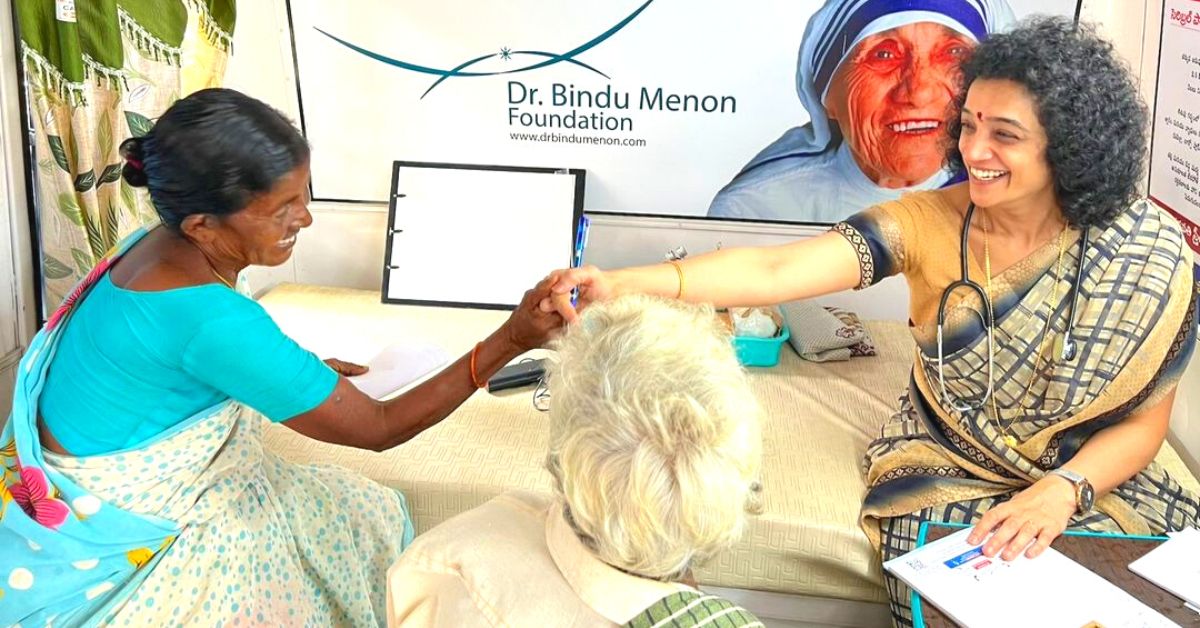
‘We have seen a change’
Dr Menon does not come from a family of doctors. Born and raised in Bhopal, her father was an engineer and mother, a homemaker. As a child, she had a penchant of helping the needy.
“I would knock on doors and collect charitable donations and send the funds to Help Age India, an organisation helping the disadvantaged elderly. Quite early in my life, I realised that my calling is for medicine,” she recalls.
Upon arriving in Nellore in late 2008, Dr Menon joined the Department of Neurology at Narayana Medical College and Hospital as a faculty member, eventually becoming head of department during her near six-year tenure there. It’s here where the seeds were sown for the Dr Bindu Menon Foundation, which she would launch in 2013.
There was also another incident that would change the way she looked at medicine.
On one Saturday evening, while she was settling for dinner, her phone rang. She picked up the phone and rushed to the emergency room. After arriving at the hospital, she headed straight for the hospital’s red zone. There, she was briefed about an active 65-year-old gentleman who had a stroke several hours ago. He had completely lost movement on his right side.
Dr Menon did a thorough neurological examination, checking his blood tests and scans as well. After setting down the treatment, she sat down with his relatives and explained the prognosis and long-term outcome. After a long discussion, they left and thanked her.
“I thought my job here was done. As I walked out of the emergency room, however, I heard someone calling me. I turned back to find his granddaughter, a teenager who was obviously crestfallen from the incident. She approached me and asked me two questions. Could we have averted this event? Did we delay in bringing him to the hospital? In a guarded tone, I said yes this event could have been averted and that they did delay in bringing him to the hospital. But I also pacified her saying that your grandfather will be well and recover,” she recalls.
There was an uncertainty in the air as they parted ways. Dr Menon had realised that her job here was far from done. More needed to be done for patients like him.
“When you join a medical college, you receive people from all strata of society, including people from below poverty line and across the whole household income spectrum. There is a journey a doctor embarks on with a patient, especially when they have chronic diseases. When I left after six years, they would ask me, ‘What will happen to us?’. Although I said there would be somebody else, they had obviously developed a bonding with me,” recalls Dr Menon.
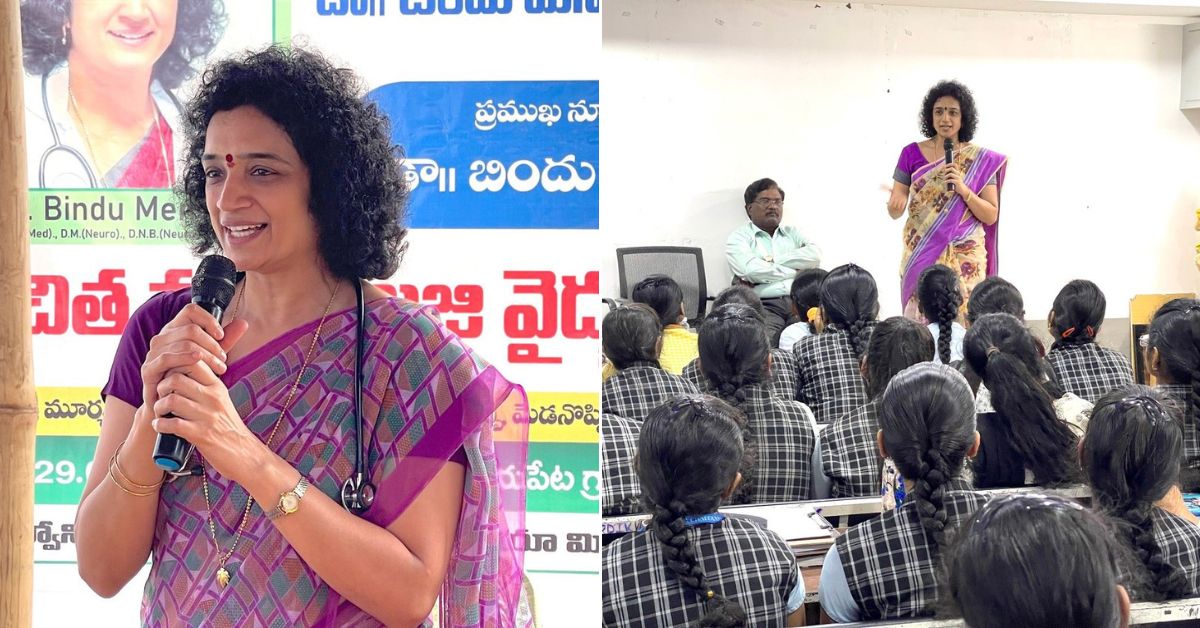
“During my time at Narayana, I thought about starting my own foundation where I could to the best of my capacity treat some of these patients, see them monthly, give them medications depending on how much it is possible, counsel them and see that their neurological health is well taken care of. In August 2013, I started my foundation,” she adds.
Following the launch of the Dr Bindu Menon Foundation, the doctor continued her regular awareness programmes. More importantly, however, she started a monthly medical camp at her foundation’s premises with a couple of patients initially. She didn’t advertise it, but more people from lower income households began attending these camps purely through word of mouth. Today, 150-200 patients attend these monthly medical camps.
“These include patients who have been coming to see me since 2013. Almost 60%-70% have started going to work, or in the case of the elderly, getting back on their feet, functioning on their own, and walking around independently with a walking stick or other devices,” claims Dr Menon.
“We have seen a change in their health. Some of them suffered a stroke when they were young. Others were persons with epilepsy. So, we motivated them to get back to work with medications. If they are elderly, they can manoeuvre themselves around the house so that there need not be a caregiver who is bound to that person. That caregiver can now get back to work,” she adds.
Dr Menon conducts treatment for these patients in her own clinic in the town premises. This is the same place where she runs her foundation and other activities.
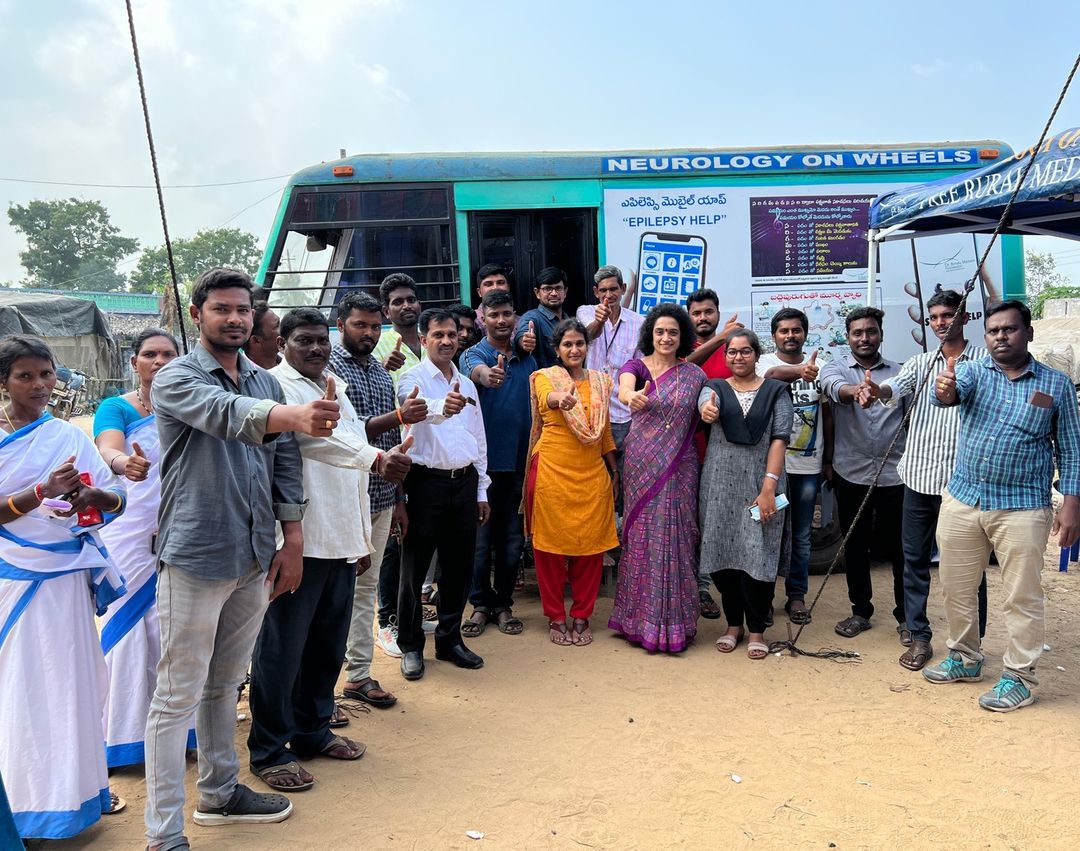
Crucial healthcare on wheels
Nellore district has neurological patients from several small and remote villages, but they can hardly come to a city hospital. During her camps, Dr Menon would keep reminding her patients to reach the hospital in four and a half hours for a stroke. But when she first visited some of these villages, she realised that barely anyone could come to the city hospital for treatment in four and a half hours. The reasons for this were plenty.
“One, they have to understand the disease, be aware of it, then they have to decide where to go for treatment, and come to a neurologist. It’s impossible for any person from these remote villages to follow our recommendation of visiting a hospital four hours after a stroke,” she says.
When she used to organise these camps in the city, several patients would say they had a family member in their village suffering from a given neurological condition. But she was told that they couldn’t afford to come into the city.
“Also, there were many people in these parts with so many diseases that they didn’t even know whether they should go to a neurologist or not. That’s when we felt that we should have an outreach programme. These people are reaching us in the city, but then there are so many people out there who probably don’t even know what’s happening,” she recalls.
In medicine, it’s a common saying that prevention is better than cure. But there is also something called primordial prevention—preventing the risk factor.
“Primordial prevention is when we visit schools and colleges, and tell them about the diet, exercises they can do, salt intake and all the other things they can do to ensure hypertension, diabetes, obesity and high cholesterol don’t spiral out of control,” explains Dr Menon. In 2015, she started going to these villages because these rural patients couldn’t reach her camps.
Reach, teach, treat and care
At the heart of Dr Menon’s ‘Neurology on Wheels’ initiative is the motto, “we reach, we teach, we treat and we care”.
The first thing the foundation does is reach underprivileged patients in these remote and deprived villages. This is followed by ‘teach’. “When we arrive at these villages, nearly all residents turn up irrespective of whether they’re suffering from a neurological problem or not. This creates a captive audience for us. Of course, if I say something one time, it may not get through to all of them. But even if what I say touches 10% of the residents there, we would have created some impact because diseases like stroke are devastating,” explains Dr Menon.
In that ‘teach’ programme, she takes a full lecture with a mic and sound system. She tells residents about how they can prevent hypertension, diabetes, the impact of smoking and alcohol, how to detect conditions like stroke and epilepsy, their symptoms, the time window they have for treatment, etc. She also talks about where the nearest primary healthcare centre (PHC) is located, the doctor available there, where they should go for a checkup, how they should perform first aid in the event of an epilepsy attack, how to proceed with treatment, etc.
Then her team starts screening patients for height, weight, hypertension, and diabetes, and takes note of the medications they’re taking or not.
“Inside our medical bus, we have a couch, sitting area and all my instruments for neurological examination. We have a view box for any X-rays or CT scans that may have been done in the past. We screen them for hypertension, diabetes, stroke, epilepsy and other neurological disorders.”
“Following our diagnosis, we will give them medications for a month or two weeks and tell them what lifelong medications they should be taking. We also ask them to visit the nearest PHC and they should continue to visit them for these diseases, otherwise the repercussions can be bad,” she says.
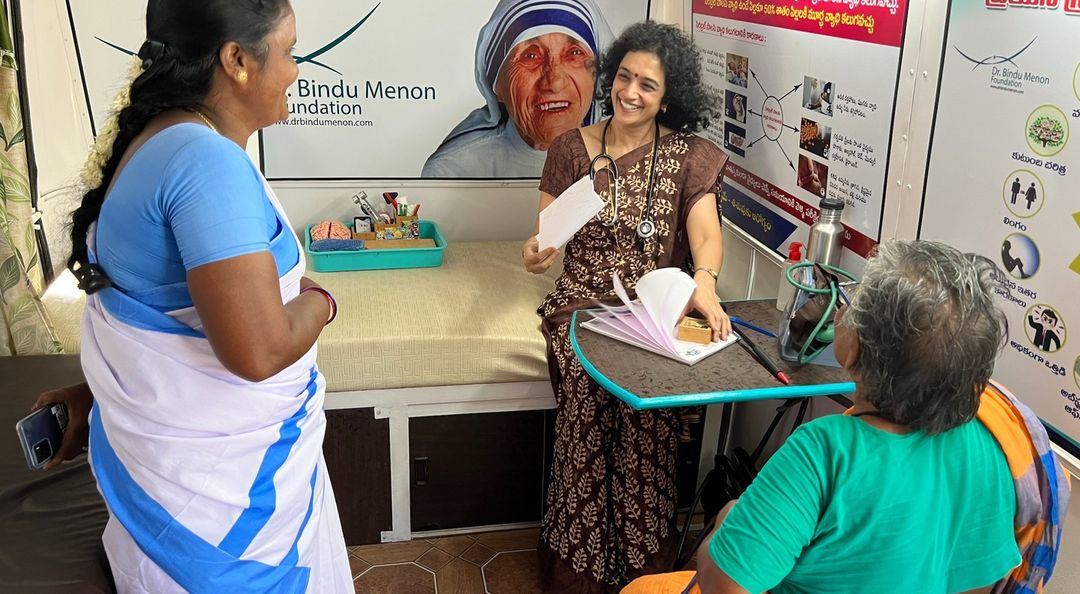
If you have the will
Starting out, Dr Menon and her team were not revisiting the villages they had already visited. But now they have started a programme along with the World Federation of Neurology, where they are trying to assess their intervention in a village.
“We visit a village every three months and keep enhancing awareness, detection programmes for stroke, epilepsy, transient ischemic attacks and any small seizure event that has happened, besides trying to find out whether they’re taking the medications properly. We do so either in person or ask the local PHC doctor and ASHA worker present there to organise an one on one interaction,” explains Dr Menon.
In addition, the PHC doctor and ASHA worker also ask them about their current state of health or whether any new symptoms have emerged, etc.
For her incredible work, Dr Menon received the Mridha Spirit of Neurology Humanitarian Award and the AB Baker Teacher Recognition Award from the American Academy of Neurology in 2022. In 2021, the World Stroke Organization honoured her with the Fellowship of the World Stroke Organization (FWSO). In 2018, they felicitated her with the World Stroke Award for Individual Achievement for her “impressive programme to reach out to populations in rural communities to raise awareness of stroke prevention and to identify stroke risk among the population”, besides “increasing access to treatment for people at risk of stroke”.
A part of the funding comes from Dr Menon’s own pocket. Funding for the monthly camps comes from the CSR funds of some companies. For ‘Neurology on Wheels’, her foundation runs a funded project from the World Federation of Neurology.
“We often give them two-weeks worth of medication. They have to get themselves checked after two weeks and then they take the medication. But I do have 140 stroke patients who have required one month treatment and similarly for 105 of my epilepsy patients,” explains Dr Menon.
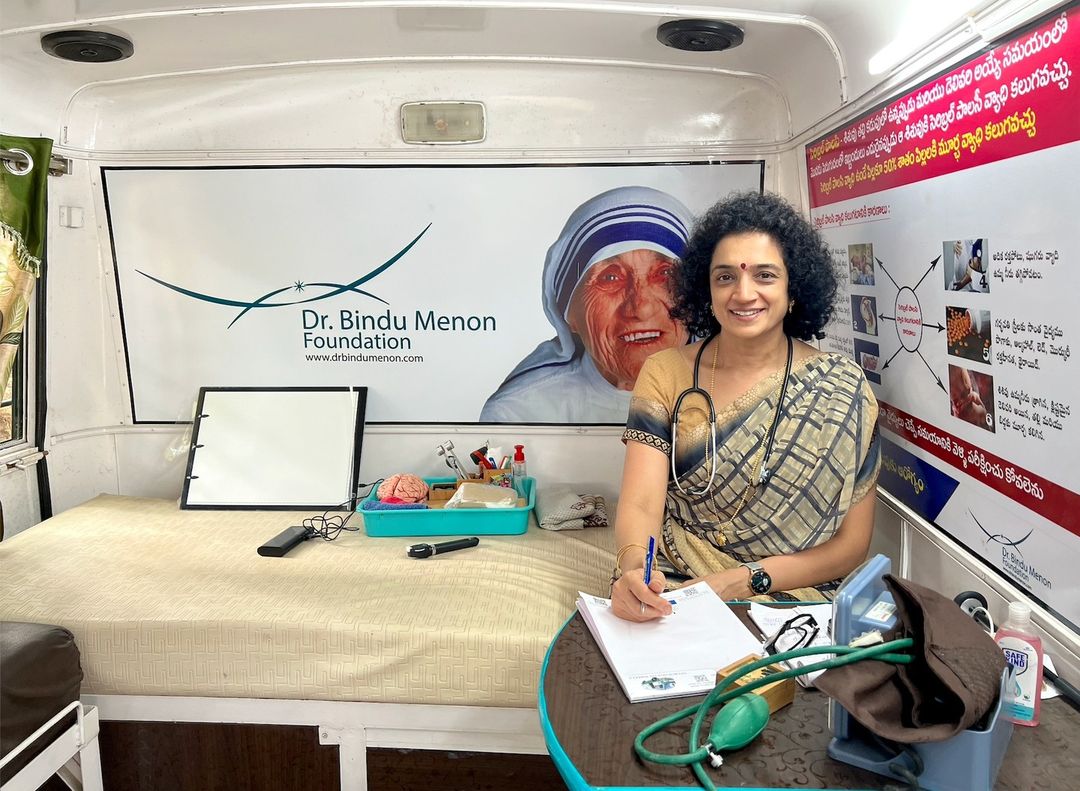
Assisting her in these endeavours are local volunteers and nursing students from local colleges. The funding she needs comes from the fact that her team travels in a bus and pays fuel costs.
“If you have the will, you do not really need to worry too much about money. Good work needs good clinical acumen, good charting out of patients and giving them the treatment that is needed,” she adds. If you found our stories insightful, informative, or even just enjoyable, we invite you to consider making a voluntary payment to support the work we do at The Better India. Your contribution helps us continue producing quality content that educates, inspires, and drives positive change. Choose one of the payment options below for your contribution- By paying for the stories you value, you directly contribute to sustaining our efforts focused on making a difference in the world. Together, let’s ensure that impactful stories continue to be told and shared, enriching lives and communities alike. Thank you for your support. Here are some frequently asked questions you might find helpful to know why you are contributing?

Know more about the Dr Bindu Menon Foundation here.
(Edited by Divya Sethu; Images courtesy Dr Bindu Menon/Instagram)
This story made me
-
97
-
121
-
89
-
167




